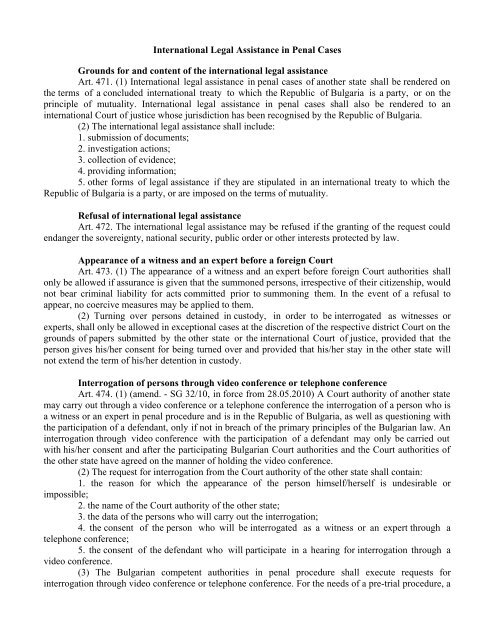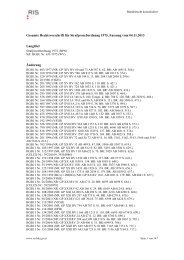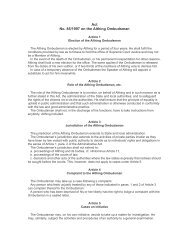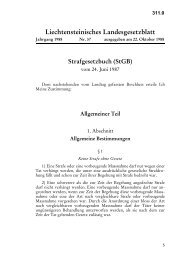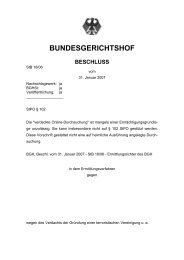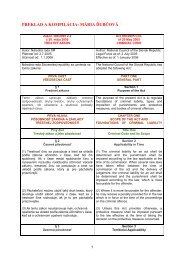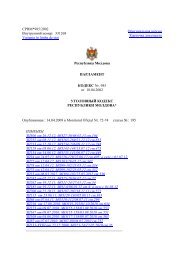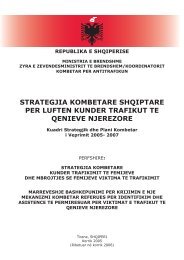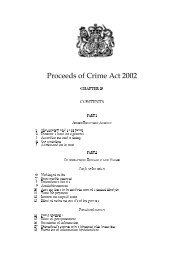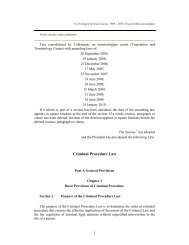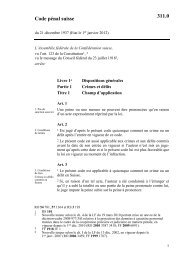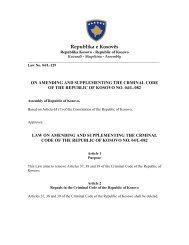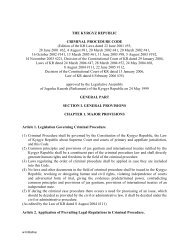PENAL PROCEDURE CODE In force from 29.04 ... - Legislationline
PENAL PROCEDURE CODE In force from 29.04 ... - Legislationline
PENAL PROCEDURE CODE In force from 29.04 ... - Legislationline
You also want an ePaper? Increase the reach of your titles
YUMPU automatically turns print PDFs into web optimized ePapers that Google loves.
<strong>In</strong>ternational Legal Assistance in Penal Cases<br />
Grounds for and content of the international legal assistance<br />
Art. 471. (1) <strong>In</strong>ternational legal assistance in penal cases of another state shall be rendered on<br />
the terms of a concluded international treaty to which the Republic of Bulgaria is a party, or on the<br />
principle of mutuality. <strong>In</strong>ternational legal assistance in penal cases shall also be rendered to an<br />
international Court of justice whose jurisdiction has been recognised by the Republic of Bulgaria.<br />
(2) The international legal assistance shall include:<br />
1. submission of documents;<br />
2. investigation actions;<br />
3. collection of evidence;<br />
4. providing information;<br />
5. other forms of legal assistance if they are stipulated in an international treaty to which the<br />
Republic of Bulgaria is a party, or are imposed on the terms of mutuality.<br />
Refusal of international legal assistance<br />
Art. 472. The international legal assistance may be refused if the granting of the request could<br />
endanger the sovereignty, national security, public order or other interests protected by law.<br />
Appearance of a witness and an expert before a foreign Court<br />
Art. 473. (1) The appearance of a witness and an expert before foreign Court authorities shall<br />
only be allowed if assurance is given that the summoned persons, irrespective of their citizenship, would<br />
not bear criminal liability for acts committed prior to summoning them. <strong>In</strong> the event of a refusal to<br />
appear, no coercive measures may be applied to them.<br />
(2) Turning over persons detained in custody, in order to be interrogated as witnesses or<br />
experts, shall only be allowed in exceptional cases at the discretion of the respective district Court on the<br />
grounds of papers submitted by the other state or the international Court of justice, provided that the<br />
person gives his/her consent for being turned over and provided that his/her stay in the other state will<br />
not extend the term of his/her detention in custody.<br />
<strong>In</strong>terrogation of persons through video conference or telephone conference<br />
Art. 474. (1) (amend. - SG 32/10, in <strong>force</strong> <strong>from</strong> 28.05.2010) A Court authority of another state<br />
may carry out through a video conference or a telephone conference the interrogation of a person who is<br />
a witness or an expert in penal procedure and is in the Republic of Bulgaria, as well as questioning with<br />
the participation of a defendant, only if not in breach of the primary principles of the Bulgarian law. An<br />
interrogation through video conference with the participation of a defendant may only be carried out<br />
with his/her consent and after the participating Bulgarian Court authorities and the Court authorities of<br />
the other state have agreed on the manner of holding the video conference.<br />
(2) The request for interrogation <strong>from</strong> the Court authority of the other state shall contain:<br />
1. the reason for which the appearance of the person himself/herself is undesirable or<br />
impossible;<br />
2. the name of the Court authority of the other state;<br />
3. the data of the persons who will carry out the interrogation;<br />
4. the consent of the person who will be interrogated as a witness or an expert through a<br />
telephone conference;<br />
5. the consent of the defendant who will participate in a hearing for interrogation through a<br />
video conference.<br />
(3) The Bulgarian competent authorities in penal procedure shall execute requests for<br />
interrogation through video conference or telephone conference. For the needs of a pre-trial procedure, a


